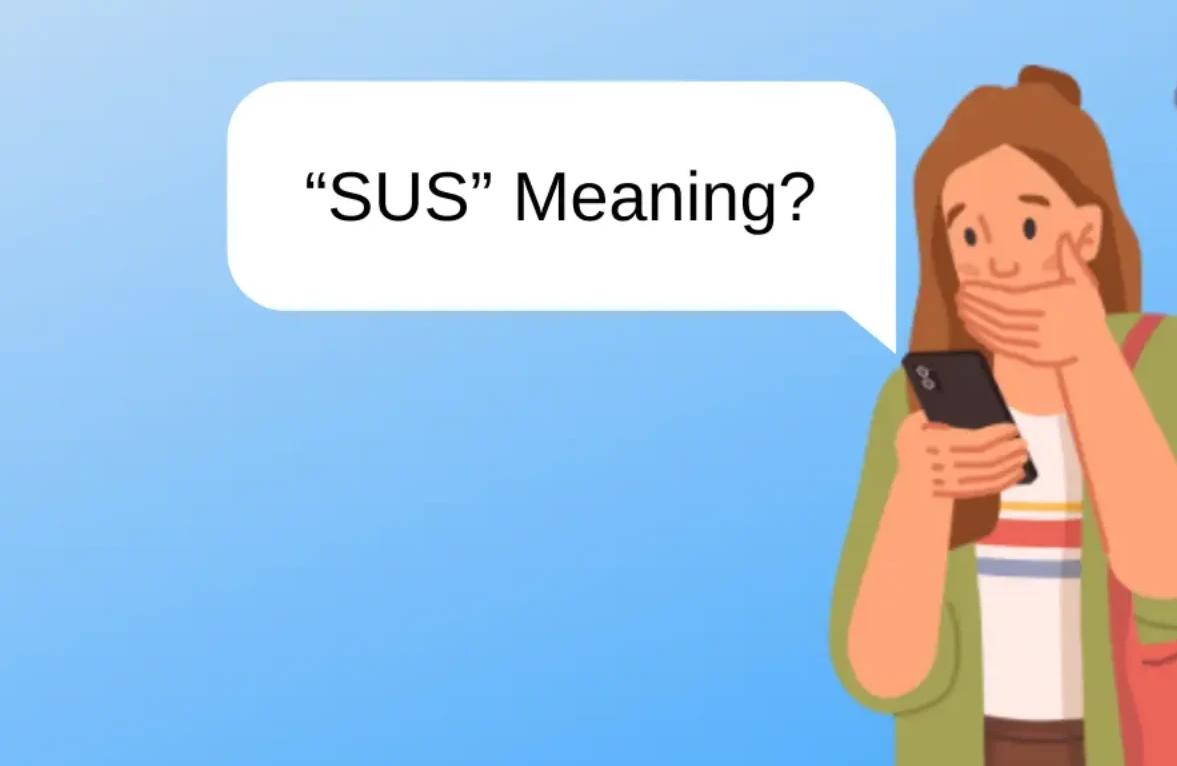In the modern world, it is essential that a parent and a guardian know such slang as sus. “What is sus?” is a question that has gained popularity in the conversation of children and adolescents. The article discusses the meaning of sus, the reason why it is so popular, how it has been used, and why children use it. The parents will also be taught how to watch their children use internet slang without putting them in danger. Knowing about sus helps parents to communicate with the children better and keep them safe online.
What is Sus?
Sus is an acronym of suspicious or suspect. It is a colloquialism that is used to refer to something or a person that seems unreliable or dubious. When a person says that something or somebody is suspicious or is sus, he is suggesting that he does not believe that person or situation is true or sincere. The term is common in the internet community, chat apps, and social media.
In the slang of police, originally, a root word such as sus has been used as a short version since as early as the 1920s or 1930s in the British police force. Sus was a shortcut that was utilised by officers to designate suspicious individuals. In time, this short term entered into colloquial language in some urban societies, particularly the UK and the US. The term itself was a niche until recently, when it went viral with online gaming and social media.
The revival of the word “sus” in youth slang started with the online multiplayer game “Among Us” in the first place. The game was released in 2018, and the players will have to know the impostors who act wary of their fellow crewmates. The players refer to suspicious behavior by using the term SUS. This gaming environment made the world very available and applicable to the new generation. Sus has then become a digital communication feature.



Why is Sus so popular?
It is a great number of things that made “sus” popular. To start with, there was a major role of memes and internet culture. Social networks, such as TikTok, Instagram, and Twitter, have content that is rapid and engaging, where short, catchy words are thriving. Internet users popularized “Sus” through funny images, videos, and posts, causing it to spread rapidly.
Secondly, the video game Among Us contributed to the propagation of the idea of sus into the mainstream. The popularity of the game among people, and in particular the lockdowns caused by the global pandemic in 2020, gave millions of people a chance to learn the slang. The fundamental game mechanics, which involved pointing fingers at the players of the in-game team of sus, were a perfect fit to the meaning of the slang. This collaboration made sus vital in expressing suspicion.
It is also popular because of its simplicity and versatility in the world, sus. Three letters are enough to make judgments about trust and honesty within a short period of time. The conciseness is appropriate in the context of fast Internet communication, when a player and a social media user are fond of the terse. The name is not serious but effective —a mix that appeals strongly to the younger generations.
How do people use ‘Sus’ in everyday language?
People use the word “Sus” differently in real-life conversations, online chats, and meme culture. For example, people may call someone “sus” when that person acts strangely or seems secretive. One of the typical sentences would be, He is being sus or That is a little sus. Such words suggest suspicion of his or her motives or sincerity.



Sus is an expression in gaming that is used to accuse other players of having acted in a misleading way. As an example, in Among Us, players are always saying Red is sus when they have suspicions that Red is the imposter. The use of this simple and straight forward application has leaked into normal speech outside the gaming sector.
“Sus” is not always negative. It is sometimes jokingly used amongst friends. It is also used as an irony to mock one another. The context is what dictates whether it has a serious accusation or a light joke. This elasticity makes the word dynamic and trendy.
Empower your children to explore the web safely with tailored content filters.
Why do kids use the word “Sus”?
The common usage of the word sus among children and adolescents is indicative of the digital communication that we have now. Youths are taking huge quantities of memes, viral content, and social media trends every day. Children learn slang from these language sources, adapting it for quick expression and social belonging.
The fact that it suits their communication style, being quick, informal, and sometimes playful, led Generation Z (born mid-1990s to early 2010s) to adopt the word sus. The name itself has become a hit in the gaming communities, particularly among Among Us. This has further established the name among the youth.
Kids use the term “sus” to sound modern and relevant when expressing suspicion or doubt. It is a language shortcut that transfers complicated social judgments immediately. The sharing of “sus” is also indicative of belonging to peer groups and web cultures. So, most of the time, it is the peer pressure and the need to fit in that nudges kids towards using slang words like sus.
How to monitor and protect your kids from internet slang like Sus
It takes you being tech-conscious and active to monitor and keep your kids off the internet slang, such as “sus”, etc. Slangs change fast and are able to obscure inappropriate materials or malicious online practices. Parents should stay informed and involved as children increasingly socialize through social media, gaming, and messaging apps. The best way to protect both parent and child is to reduce risks and build digital resilience through parental control tools and regular discussions about language and online safety. Active parental involvement ensures that children enjoy a safe, age-appropriate, and healthy online experience that benefits them long-term.
Why parents should care about slang
Although slang words such as sus can be good and even harmless, it is not always the case. Internet slang can also be misused in harmful ways, such as bullying, manipulation, or social exclusion. As an illustration, insulting someone as a sus may degenerate into harassment or being socially isolated.
A recent study by ICCOM states that careless or hurtful words can leave lasting scars on a child’s self-esteem and emotional well-being. Negative comments, ridicule, and harsh criticism can erode a student’s motivation, confidence, and desire to engage actively in the learning process. So, parents need to be in the know about all the new slang to safeguard their child against bullies and anyone who can impact their mental health.
Protect kids with FlashGet Kids
FlashGet Kids is a reputable parental control application that assists parents in monitoring and controlling their children. This tool is especially useful in the context of their online security. It has strong capabilities to monitor the use of apps and screen time that promote healthy device usage.
The content filters of the app prevent the children from accessing unfit websites and applications and limit them to safe content. It gives warnings to parents when the keywords are suspicious in the context of the messages on social media apps. The app immediately notifies parents through its Keyword Detection system whenever “sus” is used in a worrying context.
FlashGet Kids also supports real-time activity report, location monitoring, and live monitoring to keep the parents in the know. Moreover, you can restrict and regulate your child’s digital habits with screen time limits. Similarly, the app blocking features within this app are pretty robust. These tools will help parents react in advance and help their children navigate the waters of online communication. All in all, this application creates more secure online spaces among children.
Conclusion
Sus is a slang word, which translates to suspicious or suspect, that has some ancient derivations, but has seen dramatic growth in popularity recently. It has taken the form of 20th-century police jargon to become a content of Gen Z communication. It is mainly due to gaming and social media culture.
Today, people use “sus” to express genuine mistrust, light teasing, or to strengthen social bonds. Its high level of brevity and flexibility has contributed to its popularity in fast social determinations in online debates.
Parents should be aware of such slang words as sus and be able to interpret their meaning. This is because doing so will enable them to ensure safe online experiences for their children. Tools like FlashGet Kids offer practical ways to monitor and protect children from potential risks linked to internet slang.
Parents should create awareness and communication. This will help them to better manage the ever-changing language of the digital generation. This will make children knowledgeable about the current terminologies. At the same time, they will be able to stay secure and defended on the internet.

